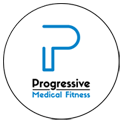
Relief for Your Jaw Pain
Do you find that chewing or yawning has become difficult? Is your jaw painful? When you open or close your mouth, do you hear a clicking sound? If these symptoms are familiar, you may have TMJ dysfunction.
Temporomandibular joint dysfunction, commonly referred to as TMJ dysfunction, is a condition that causes pain and stiffness of the joint and muscles of the jaw.
The temporomandibular joint connects the jaw to the skull and allows for the mouth to open and close. TMJ dysfunction develops as a result of injury or damage to this joint.
The complexity of this important structure composed of bones, tendons, and muscles may cause you to feel pain on one or both sides of the jaw if dysfunction develops. A dysfunction of this joint can make opening your mouth to talk, yawn, or chew difficult and uncomfortable.
Are you living with TMJ dysfunction? Request an appointment with our physical therapy team at Progressive Medical Fitness to find relief from TMJ pain.
Physical therapy relief for TMJ dysfunction
There are a variety of home remedies that can successfully treat some cases of TMJ dysfunction. Over-the-counter pain relievers, such as Ibuprofen or Aspirin, may provide relief for some. Another home remedy is to apply an ice pack directly to the jaw joint to help diminish pain. Sedative essential oils, such as clary sage or lavender, may also help you find temporary relief.
When home remedies are not able to provide long-term relief, medical intervention may be necessary. Prescription medication, such as muscle relaxers or anti-inflammatory medications, may be prescribed to manage pain.
Dental splints, created specifically for you from a jaw specialist, are designed to keep teeth properly aligned and prevent grinding of the teeth, particularly at night. Trigger point acupuncture, joint replacement, or a TMJ arthroscopy are other examples of medical intervention for TMJ dysfunction.
However, it is possible to take a non-invasive and holistic approach to treating TMJ dysfunction. Physical therapy is one of the most effective treatments for TMJ dysfunction and avoids potentially harmful prescription pain medications.
At Progressive Medical Fitness, a thorough physical evaluation of your neck, shoulder girdle, and thoracic spine will be performed to determine if those structures are causing your symptoms. Afterward, a dedicated member of our physical therapy team will develop a personalized treatment plan to address your specific symptoms and needs.
The goal of physical therapy for TMJ dysfunction is to restore the normal functioning of the jaw and the interaction between the jaw muscles and joints. Our physical therapy team analyzes the mobility of your jaw and uses manual techniques to release muscle tension in the surrounding areas of your neck and head.
Your treatment plan may consist of a combination of methods and modalities, such as soft tissue massage, joint mobilization, jaw exercises, myofascial techniques, electrical stimulation, or ultrasound.
Symptoms of TMJ dysfunction
Pain in the jaw, jaw popping / crackling, headaches, sore jaw muscles, “lock” jaw, pain in the temples, and earaches are symptoms that people experience who suffer from TMJ dysfunction.
Common causes that TMJ dysfunction may develop include arthritis, misalignment of the teeth, gum chewing, teeth grinding, or a jaw injury. Diagnosing TMJ dysfunction is complex and usually a few assessment techniques are utilized.
If you are suffering from symptoms of TMJ dysfunction, the first step is to share your symptoms and concerns with your physician, who will consider your medical history and conduct a physical exam. Your physician may seek a second opinion from a specialist such as an otolaryngologist or a dentist specializing in jaw disorders.
Your team of doctors will work together to rule out other medical conditions before diagnosing the patient with TMJ dysfunction. There are a number of ailments with similar symptoms that should be considered such as trigeminal neuralgia, salivary gland disease, or swollen lymph nodes.
Once a final diagnosis has been made, your physician will develop a treatment plan to address your condition.
Find relief for TMJ dysfunction today
If you are suffering from the symptoms of TMJ dysfunction, request an appointment with our physical therapy team at Progressive Medical Fitness. Our highly trained physical therapy team is patient-centric and takes a holistic approach to your well-being. Begin taking the steps to address TMJ dysfunction today. You need not suffer from jaw pain and stiffness any longer.
